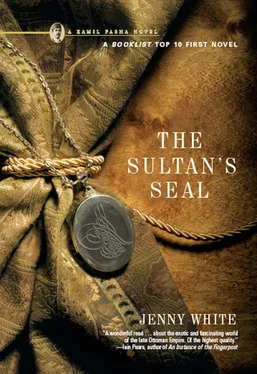Jenny White - The Sultan's seal
Здесь есть возможность читать онлайн «Jenny White - The Sultan's seal» весь текст электронной книги совершенно бесплатно (целиком полную версию без сокращений). В некоторых случаях можно слушать аудио, скачать через торрент в формате fb2 и присутствует краткое содержание. Жанр: Исторический детектив, на английском языке. Описание произведения, (предисловие) а так же отзывы посетителей доступны на портале библиотеки ЛибКат.
- Название:The Sultan's seal
- Автор:
- Жанр:
- Год:неизвестен
- ISBN:нет данных
- Рейтинг книги:5 / 5. Голосов: 1
-
Избранное:Добавить в избранное
- Отзывы:
-
Ваша оценка:
- 100
- 1
- 2
- 3
- 4
- 5
The Sultan's seal: краткое содержание, описание и аннотация
Предлагаем к чтению аннотацию, описание, краткое содержание или предисловие (зависит от того, что написал сам автор книги «The Sultan's seal»). Если вы не нашли необходимую информацию о книге — напишите в комментариях, мы постараемся отыскать её.
The Sultan's seal — читать онлайн бесплатно полную книгу (весь текст) целиком
Ниже представлен текст книги, разбитый по страницам. Система сохранения места последней прочитанной страницы, позволяет с удобством читать онлайн бесплатно книгу «The Sultan's seal», без необходимости каждый раз заново искать на чём Вы остановились. Поставьте закладку, и сможете в любой момент перейти на страницу, на которой закончили чтение.
Интервал:
Закладка:
I find myself wondering what it would be like to remain here, especially as Father shows no interest in leaving. There is much to be admired in the life of an Ottoman lady, although there is something childlike and seductive about it, quite unsuitable for the civilized mind. They seem never to use their heads for more than interminable intrigues, like squabbling children, although with rather more severe consequences. Still, these women are not as soft and passive as they appear. They can move from languorous and childlike to regal and commanding in moments. Their nature is not fixed, like ours.
As you can see, I have retained my objectivity and have not, as you suggested in your last letter, “gone native.” These days, though, the families of officials I visit with Father live much as we do. The women’s gowns are the latest Paris fashion, likely more up-to-date than those of Essex ladies. The men too dress in European style. Men and women dine at table together, then retire to separate rooms, as we do at home. It is true that their taste in European furnishings is untutored. The coat rack might be placed right next to the piano. They have a love of ostentation that renders even the best gown hideous when topped by a jewel-encrusted kerchief. And the men wear that tasseled, round felt flowerpot on their heads. But this is simply inexperience with the medium of civilization, as natural as children learning to walk. If ever I have my own household here, I will entice you and Richard and the boys to come visit, and perhaps the Orient will seduce you, as you claim it has seduced me.
I’m sitting in the shade of the pines on the patio and can hear the cheerful toots of the steam ferries that ply the Bosphorus beyond the Residence wall. I do so wish I could share my thoughts with you here by my side. I have been trying to rein in my imagination, as you have so often advised me to do. Shukriye is arriving in a few days. I think I will visit her first and see whether there is anything to learn before mentioning it to Kamil.
You know, when Kamil comes by, we sometimes sit in the kitchen, quite companionably, like an old couple over a cuppa’. I’ve invited him to dine with Father and me this evening. Our old chef, Monsieur Menard, has come to mind quite a bit lately. A sign of impending age, perhaps-reminiscing about the past, though I have precious little past to occupy me. However, as you are fond of saying, there is always the future.
I’ve rambled on much too long again, my dear. You write that you avidly read these digressions of mine and that they are a welcome respite from your duties. Nevertheless, I feel I impose myself far too much with these long missives. In my own defense, I have never felt so alive. And who better to share this with than my devoted sister with whom I have ever enjoyed a rare friendship and commonality of mind and sentiment? In the name of that friendship, forgive my imposition on your busy day with these fanciful accounts of mine.
As always, my love to you and the men of your family, for that is what I will find when at last I see my dear nephews.
Your loving sister,
Sybil
18
After dinner, Sybil and Kamil stand on the balcony off the second-floor reception hall and look out at the dimly lit city beyond the high stone wall surrounding the compound. Dusk has taken them by surprise. The Bosphorus is an emptiness beyond the city, sensed rather than seen. In the middle distance, a garland of lamps swings between the minarets of a mosque marking the holiday that celebrates the breaking of the month-long fast. The moon, slim as a fingernail paring, hangs above the dome.
“Do you really believe in kismet, that our fate is written on our foreheads?” asks Sybil.
“There’s no such thing as kismet. It’s just an expression, a superstitious belief, the resource of those too lazy to struggle to make something of themselves.”
“That’s rather uncharitable, isn’t it? Think of all the people out there”-she waves a hand toward the dark city-“who try their best, but still lead miserable lives.”
“Yes, that’s true. But I think many people don’t try as hard as they might. I mean, the thought of being completely responsible for one’s own future is exhausting to contemplate. It’s an enormous responsibility, some might say a burden, to place on the ordinary man.”
Sybil turns to him in surprise.
“So you think people are simply too lazy to better their lives, or incapable of taking the responsibility?”
“I suppose it does sound rather mean-spirited, when you put it that way.”
“I think that people can be relied upon to do their best with what they’re given. A poor man, with only a shilling in his pocket, will nonetheless spend it to clothe and feed his children.”
“Or buy rounds for his friends.”
“That’s terribly cynical.” Sybil’s voice has risen.
“I suppose it’s true,” he agrees, attempting to smooth the tension between them, “that I’ve been blessed with a wealthy, well-placed family, a house, an education, so it’s easier for me to be progressive.” He spits out the final word, surprising even himself. When did I become so cynical? he wonders.
“Do you think it’s Islam that is holding people back?”
“Kismet has nothing to do with Islam. It’s simply a superstition, like the evil eye.”
“People need religion, don’t they?” Sybil asks thoughtfully. “How else could they bear up under all the misery and hardship?”
“Religion is the scaffolding within which we build our lives. It falls away when we no longer need its support.”
“What a curious definition of religion. What is religion without belief, without faith? Isn’t faith necessary?”
“I wouldn’t know,” he answers wearily. “Religion seems to me nothing more than a set of empty rituals and linguistic niceties that mean nothing more than what they say.”
“Everything means more,” Sybil counters adamantly. “What you describe isn’t a life, it’s a shell of a life. What is progress, then, when nothing means anything?”
“Progress means to act rationally, on the basis of known facts, not according to one’s kismet or the mumblings of a hodja.”
“Surely it also means to lead a morally correct life. To give your shilling to your children, instead of drinking it away, as you yourself said.”
“Yes, of course. Civilization doesn’t mean everything is acceptable. On the contrary. There are standards that everyone can learn.”
“And where do they learn moral standards? In church, in the mosque.”
“From parents. And in schools that can correct for the parents’ shortcomings. Proper schools that teach science and the arts, the truly great moral triumphs of the modern age, not the niggling do’s and don’t’s of the prayer books.”
“Niggling? My God, those do’s and don’t’s are civilization. They’re a moral compass. Without them, people are empty vessels, no matter how clever and rational they might envision themselves to be.”
Kamil does not like heated arguments, but respects Sybil for holding her ground. He is tired, his investigation finding no foothold.
“I should go, Sybil Hanoum.” He sees the sadness in her face and feels ashamed that he was the cause of it. He doesn’t move.
“Yes.” She seems at a loss for words. They remain on the balcony, leaning on the wrought-iron railing. Looking out at the dark shapes of trees and buildings, Kamil reflects on how many colors there actually are in what is carelessly called black.
Finally, she says, “I do agree that religion isn’t the only way to learn moral behavior. And it is true that religion is often used unscrupulously to manipulate people and to encourage and justify uncivilized behavior. We’ve had enough of that in England, with our various kings and wars and injustices. But it would be so sad to lose”-she tilts her chin and looks up at him-“those ‘little niceties.’”
Читать дальшеИнтервал:
Закладка:
Похожие книги на «The Sultan's seal»
Представляем Вашему вниманию похожие книги на «The Sultan's seal» списком для выбора. Мы отобрали схожую по названию и смыслу литературу в надежде предоставить читателям больше вариантов отыскать новые, интересные, ещё непрочитанные произведения.
Обсуждение, отзывы о книге «The Sultan's seal» и просто собственные мнения читателей. Оставьте ваши комментарии, напишите, что Вы думаете о произведении, его смысле или главных героях. Укажите что конкретно понравилось, а что нет, и почему Вы так считаете.












